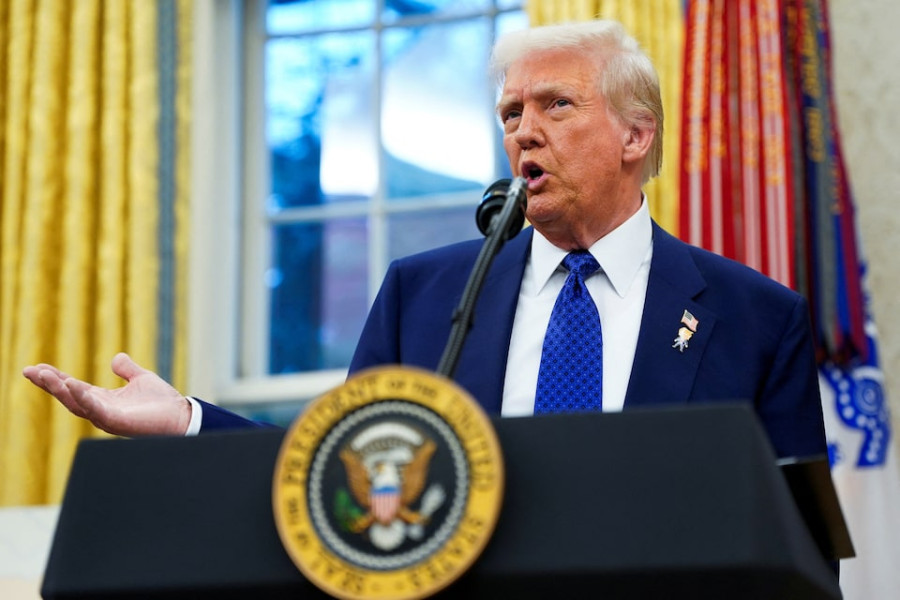World
US judge allows Trump to proceed with government employee buyout
Unions have advised their members not to accept the buyout, warning that Trump cannot be trusted to honour the deal.
Reuters
A US judge on Wednesday allowed Donald Trump’s administration to proceed with a buyout scheme for federal workers, potentially removing tens of thousands from government payrolls as part of a broad effort to downsize the US civil service.
US District Judge George O’Toole in Boston ruled that the programme could move forward after a legal challenge delayed it for six days. The administration said the scheme is now closed to new applicants.
“There is no longer any doubt: the Deferred Resignation Programme was both legal and a valuable option for federal employees,” the Office of Personnel Management said in a statement.
Labour unions that filed the lawsuit to halt the plan did not immediately confirm whether they would appeal the ruling or take other steps.
O’Toole determined that the unions lacked standing to sue, as they would not be directly affected by the programme.
“Today’s ruling is a setback in the fight for dignity and fairness for public servants. But it’s not the end of that fight,” said Everett Kelly, president of the American Federation of Government Employees, which represents 800,000 federal workers.
The buyout is one of several measures Trump is implementing to reduce the 2.3 million-strong civilian workforce, which he has criticised as ineffective and biased against him. He has also instructed government agencies to prepare for significant job cuts, with some already laying off recently hired employees without full job security.
Officials have been directed to plan staff reductions of up to 70% at certain agencies, sources said.
As of Friday, approximately 65,000 federal employees had signed up for the buyouts, representing around 3% of the total civilian workforce, according to a White House official.
Unions have advised their members not to accept the buyout, warning that Trump cannot be trusted to honour the deal.
The offer guarantees employees their regular salaries and benefits until October without requiring them to work, but uncertainties remain. Current spending legislation expires on 14 March, and there is no assurance that salaries will be funded beyond that date.
Lawyers for the US Department of Justice described the initiative as a “humane off-ramp” for those discontented with Trump’s broader plans to shrink the workforce and end remote working arrangements.
Unions argued in their lawsuit that the programme was “stunningly arbitrary” and violated laws preventing agencies from exceeding congressional spending limits.
In addition to ruling that the unions lacked standing, O’Toole stated that disputes involving federal employees must first go through an administrative process before being taken to court.
Unions and Democratic attorneys general have filed multiple lawsuits against Trump’s rapid restructuring of government and have secured some initial legal victories.
In a separate lawsuit filed on Wednesday, five unions sought to block what they described as the potential mass dismissal of hundreds of thousands of employees who refuse to accept the buyouts.
Layoffsvs congressional budget plan
Trump has appointed billionaire Elon Musk to lead the newly created Department of Government Efficiency, tasked with reviewing payroll and personnel records to cut $1 trillion from last year’s $6.75 trillion federal budget. Salaries for civilian employees account for less than 5% of that total.
Trump has directed federal agencies to cooperate with Musk’s team in identifying positions that can be eliminated and functions that can be discontinued.
Musk’s team has so far focused on 15 agencies and has already dismantled two – one providing aid to the world’s needy and another protecting Americans from predatory lenders. Some Republican budget experts argue the effort is driven more by conservative ideology than genuine fiscal responsibility.
Trump has ruled out cuts to popular pension and healthcare benefits for retirees, which currently account for 36% of federal spending and are projected to consume a larger share of the budget as the population ages.
Meanwhile, Trump’s Republican allies in Congress are preparing a budget plan that would cut taxes and increase security spending, a move independent analysts say would add trillions of dollars to the national debt.




 9.7°C Kathmandu
9.7°C Kathmandu














